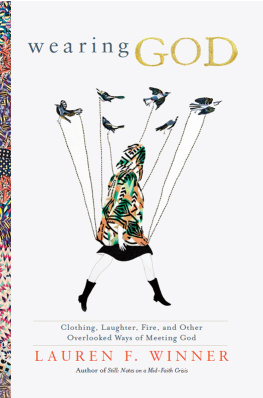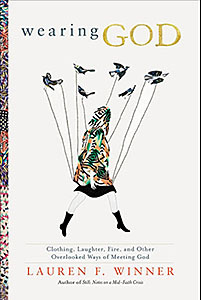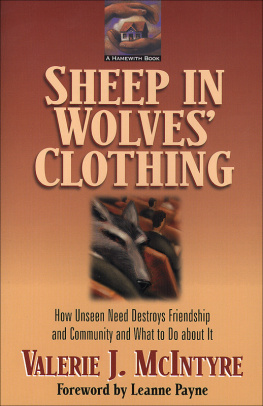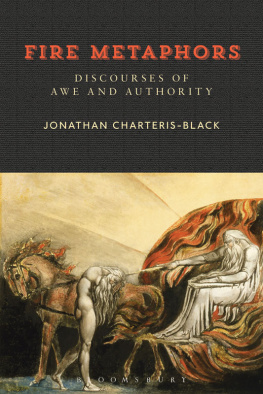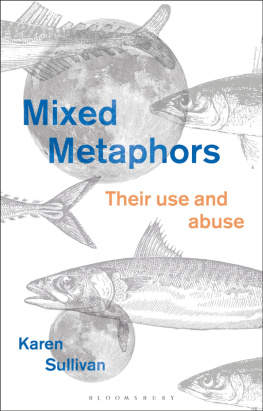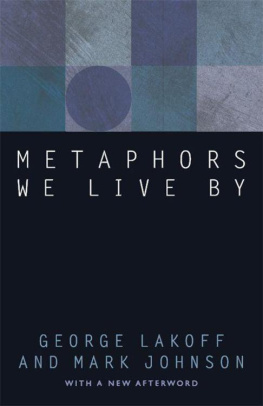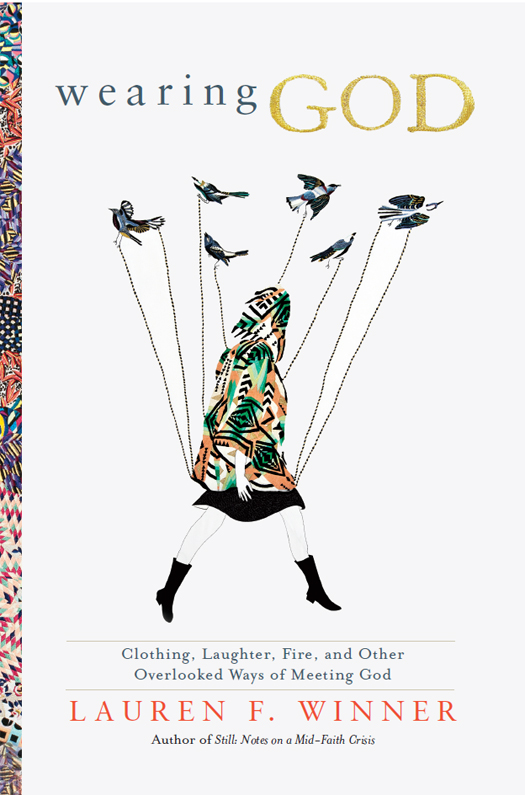For Sarah
Were we, in our effort to give an account of God, to
make use only of expressions that are literally true,
it would be necessary for us to desist from speaking
of Him as one that hears and sees and pities and
wills to the point where there would be nothing left
for us to affirm except the fact of His existence.
THE SADIA GAON
Everything I see of the heavens,
I know by the earth.
PATTIANN ROGERS
Contents

The best metaphors always [give] both a shock and a shock of recognition.
SALLIE MCFAGUE
O n some days, I know instinctively that God is closer to me than my nearest neighbor. On other days, God seems distant and inscrutable, but some days God is neighborly, and close at hand. One fine morning I see a jackdaw out my window on the branch of the tree, and for a week or so I think about how God is like a bird. And sometimes I fear God, and sometimes I dont give God a passing glance, and then I feel I should think about God more.
Sometimes, a hymn gets caught in my hair, and I sing it all week long, off and on, without ever thinking hard about what it says about God.
Some days God feels like an abyss. Some days God feels like the father I always wanted, and some days God seems like the father I actually have. Some days I know that God is whatever gives me solace, and wherever I abide. On some days, maybe many days, I dont picture God at all.
If you, like me, picture God in lots of different ways, or if sometimes God seems easy to speak about, and on some days you have no words for God, and sometimes you feel that there are too many words for God, so many that the abundance stumps youif that is the case, then you are pretty much right in line with how the Bible invites us to imagine God: in some very singular ways; in dizzyingly hundreds of ways; sometimes, in no way at all.
I started thinking about all this a few years ago when two circumstances converged in my life. The first circumstance was that I found myself newly fascinated by the Bible. I had always been a member of one or another religious communityfirst synagogues, then churchesthat loved the Bible, that encouraged individual and corporate study of the Bible, that held up the Bible as the word of God. I had diligently (and sometimes not so diligently) tried to get on board with this, but in all honesty for many years I was just not that interested in Bible reading. I liked prayer books. I liked to study church history. I found the Bible boring. And then, at about thirty-three, about five years ago, Cupid came and shot me with a Bible arrow and I got very interested in the Bible for the first time. I became like an infatuated schoolgirl, obsessed. I began to see that one of the amazing things about the Bible is that its so multilayered. Even when I think I understand a biblical story, even when I think Ive gotten to the kernel of insight the story holdsit turns out there is something more there, something I havent yet seen. As a rabbi with the wonderful name Ben Bag Bag once said of the Talmud, Turn it and turn it, for everything is in it. Look deeply into it, and grow old with it, and spend time over it, and do not stir from it, because there is no greater portion. Turn it and turn itthere is always more to see. This amazes me. This is why the Bible is different from Pride and Prejudice or Little Women. There is a lot to see in Pride and Prejudice and Little Women. There is much to see. But I do not for a minute believe that even the best novel endlessly overflows in the same way that the Bible does. This amazes me, this endless overflowing.
All that began to happen about five years ago: I began to be awake to the scriptures. At around that time, I was also in a particular spot in my friendship with God. Simply put, I had felt very far away from God for some years. It was a long season, salty and bitter, but it did not last forever. During the months in which I was emerging from that seasonthe months in which I was beginning to realize that God had been there all along; that maybe what had felt to me like Gods absence was actually a tutorial in Gods mystery; that maybe it was my imagination, not God, that had falteredduring that emergence, I began to notice God darting hither and thither, and I began to notice that I was darting hither and thither near God, and I began to realize that my pictures of God were old. They were not old in the sense of antique champagne flutes, which are abundant with significance precisely because they are oldwhen you sip from them you remember your grandmother using them at birthday dinners, or your sister toasting her beloved at their wedding. Rather, they were old like a seventh-grade health textbook from 1963: moderately interesting for what it might say about culture and science in 1963, but generally out of date. My pictures of God werent of Zeus on a throne, the Sistine Chapel God. Instead, my pictures were some combination of sage professor and boyfriend, and while sage professor and boyfriend might, as metaphors, have some true and helpful things to say about God, I found that neither of them had much to say about this new acquaintance I was embarking on, or being embarked on. All this intersected, not coincidentally, with my newfound wakefulness to the scriptures, and it led me on a search: what pictures, what images and metaphors, does the Bible give us for who God is, and what ways of being with God might those pictures invite?
T he Bible has a great deal to say about this. Your church might primarily describe God as king, or light of the world, or ruler of all. In my church, we tend to call God Father, or speak of God as shepherd or great physician. When we are really going out on a limb, we pick up Matthew and Lukes avian image and pray to God the mother hen tending her brood. Most churches do thishew closely to two or three favored images of God, turning to them in prayer and song and sermons. Through repetition and association, these few images can become ever richer: there was once a time when I didnt have many thoughts or feelings about God as great physician, but now I have prayed to that God with Carolanne, whose husband is pinned down by Parkinsons, and Belle, who so much wants to keep this pregnancy, and Albert, who is dogged by depression, and because of those prayers, and the fears and hopes and miracles and disappointments they carry, God-as-physician seems a richer image than I first understood.
Yet the repetition of familiar images can have the opposite effect. The words become placeholders, and I can speak them so inattentively that I let them obscure the reality whose place they hold. I repeat them, I restrict my prayer to that small cupful of images, and I wind up insensible to them.
Unlike my church, with its four favored metaphors, the Bible offers hundreds of images of Godimages the church has paid a great deal of attention to in earlier centuries, although many are largely overlooked now. Drunkard. Beekeeper. Homeless man. Tree. Shepherd and light are perfectly wonderful images, but in fixing on themin fixing on any three or four primary metaphors for Godwe have truncated our relationship with the divine, and we have cut ourselves off from the more voluble and variable witness of the scriptures, which depict God as clothing. As fire. As comedian. Sleeper. Water. Dog.
There are many metaphorical names for God in the biblical literature... but playing a privileged role amongst them are anthropomorphic titles. These personify God, and it seems that the biblical writers were pressed to use anthropomorphism to do justice to a God whose acts they wished to chronicle. This is a God who cajoles, chastises, soothes, alarms, and loves, and in our experience it is human beings who preeminently do these things. Early Christian theologians saw in this plentitude of divine titles a revelation of the manner in which God, while remaining one and holy mystery, is in diverse ways God

